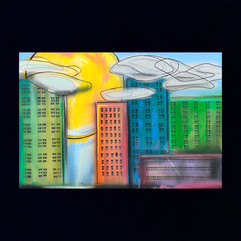by Gemma Hope Collette

The first thing you may notice about the stunning canvas paintings and prints of Huckster Art are the striking intersections of light and dark in colorful geometric forms, which are often suggestions of feelings, thoughts and experiences, rather than representations of visual reality. David Wheaton, the artist behind Huckster Art, admits freely that his artwork is a means to explore and reflect upon interior states of being, particularly centered upon aspects of mental health and recovery.
We sat down for a conversation recently at The Galleria here in Cambridge to talk about his journey as an artist, as well as the inspiration that motivates his compelling contemporary art. I asked him why he is so open about his experience battling mental health issues such as depression and manic episodes, as well as Substance Use Disorder (formerly referred to as “alcoholism” and/or “addiction”). David revealed that he enjoys “sharing the truth of my experiences with those who will listen” whether it’s through a conversation, or through the artwork itself. “When I do share,” he goes on, “I find that others are more prone to be vulnerable too, with me and with others.”
Substance use and mental health afflictions have long been associated with artists, especially some of the most influential visual artists of the 20th century such as Jackson Pollack, Jean-Michel Basquiat, and Diane Arbus, among countless others. What I find truly refreshing about David Wheaton and his work is that he’s addressing these things out in the open, and on a level that fosters healing and connection in a new way, and perhaps, for a new era of artists who don’t need to feel like they have to keep the very things that motivate our art and our expression hidden. I postulated, “It’s like we’re collectively moving into a place where the more we all share honestly about what our real mental health struggles are, the less shame we feel about it and also, I think, the more we can help others not feel ashamed of it.” I continued, “That we are shining a spotlight on behavioral health and recovery so we can begin to lift that stigma—not just as artists, writers and creators, but for everyone; it’s really a remarkable moment.” David agrees and adds, “It really is. I’ve been to rehab, I’ve been in IOP [Intensive Outpatient] and I’m not afraid to wear the clothes I’ve created.”
Indeed he is not, and his paintings, prints, and greeting card collection explore themes of depression, anxiety, loneliness and isolation. I would argue, however, that the remarkable achievement of David’s artwork is that while it may be inspired by these experiences, the pieces themselves can be reassuring and even uplifting to admire. David includes small cards with his prints that share brief stories of each image. For “The City Makes Me Anxious,” he writes “the city freaks me out sometimes. It’s overwhelming…I can handle it, just with an uncomfortable grace, inner chaos and various breathing methods.” This piece is more Representational than Abstract, wherein a glowing Moon hovers behind an array of colorful skyscrapers cast in shadow. I can’t help but love this piece and tell him, “I find this work so lovely and comforting, as it reminds me of my former home, Los Angeles, and so many special nights witnessing a similar scene.”
In his self-portrait titled “Paranoia,” David reveals that, “Paranoia loves to play tricks with your brain. Its behavior is completely illogical, leaving you to decide fight or flight. Your car is not stolen. No, they are not staring deeply into your soul. Yes, you can still breathe, cancel the ambulance.” I appreciate the way he anthropomorphizes paranoia not just as a mental state, but as a separate entity that operates with its own agenda within him. David’s work is not only beautiful and intriguing to look at, but also holds space to contemplate those intersections of darkness and light that we all go through, and about which we all struggle to overcome and express.
I address the name of David’s enterprise, “So the name ‘Huckster Art’—tell me about that.” David is eager to let me know that he really thought about the term huckster in a new way, challenging the somewhat pejorative meanings historically associated with it. “When developing my name and branding, I felt the term huckster was wonderfully fitting, mainly for my fondness of the definition, at least a portion of it.” He hones in on what I was wondering by clarifying, “I loved that it read as someone selling a product of questionable value. The questionable part is what got me. A sliding price scale determined by so many unlocked and unknown requirements of the viewer. It really reminded me why I’m doing this…to heal, to feel again, while discovering & sharing myself.”
David and I share similar attitudes and beliefs about the role of art in our personal lives and in broader culture. David closes our conversation with a quote from his website that encapsulates this.
I believe that art holds the power to connect, heal, and inspire. My work is a reflection of my own journey through the complexities of behavioral health and the path to recovery...I aim to bring attention to the often-overlooked stories of mental health and substance abuse, offering a glimpse into the raw and vulnerable experiences that shape our lives.
Please stop by Art Hub to see for yourself the remarkable artwork of David Wheaton, and maybe you’ll fall in love with his work as much as I have.

















Comments